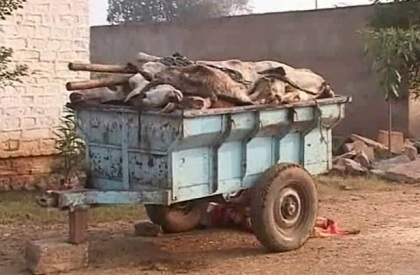SHAMEFUL: 1300 cows dead in four months in Gwalior cow shelter in Madhya Pradesh

Correspondent
NewsBits.in
GWALIOR: Around1300 cows have died in four months in a 'gaushala'--the Lal Tipara cow shelter in Gwalior, which is considered the biggest in Madhya Pradesh
Most of the Cows who fall sick after eating polythene or other adulterated food at roadside garbage dumps and those injured in road accidents have emerged be contributing highest to the mortality rate.
Though there are supposed to be all arrangements in this 'gau shala' to take care of the cows, the authorities are not able to save these cows. According to sources, every day about six to 10 cows die at the shelter.
Most of the cows that succumb are those that are brought to the shelter from the nearby areas. These cows are brought in a bad condition – when they fall sick eating polythene or adulterated food or are injured in some accident.
Every day, the Gwalior Municipal Corporation workers bring about 15-18 cows that are found roaming around on the street or found sick or injured somewhere. Sources said that even half of these cows do not survive at the centre and during past four months at least 1300 cows have perished here.
This is happening despite the hype on cow protection and violent incidents related to cows. Those involved in caring for the cows say that people let the cows that become unproductive and old off in the streets. These cows then roam the streets and eat polythene bags or other contaminated food items and fall sick.
The GMC teams bring these cows to the shelter in a poor condition. Efforts are made by the GMC and NGO authorities involved in maintenance of the shelter to save the cows, the mortality rate remains very high.
The Gwalior mayor Vivek Narayan Shejwalkar has said that despite ban on polythene, people are not giving up its use and one of the major negative impacts is on the cattle.










